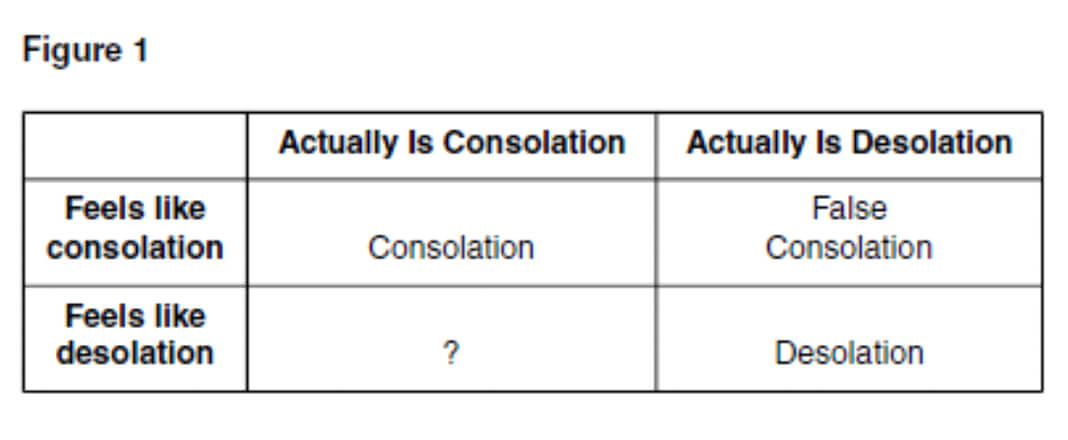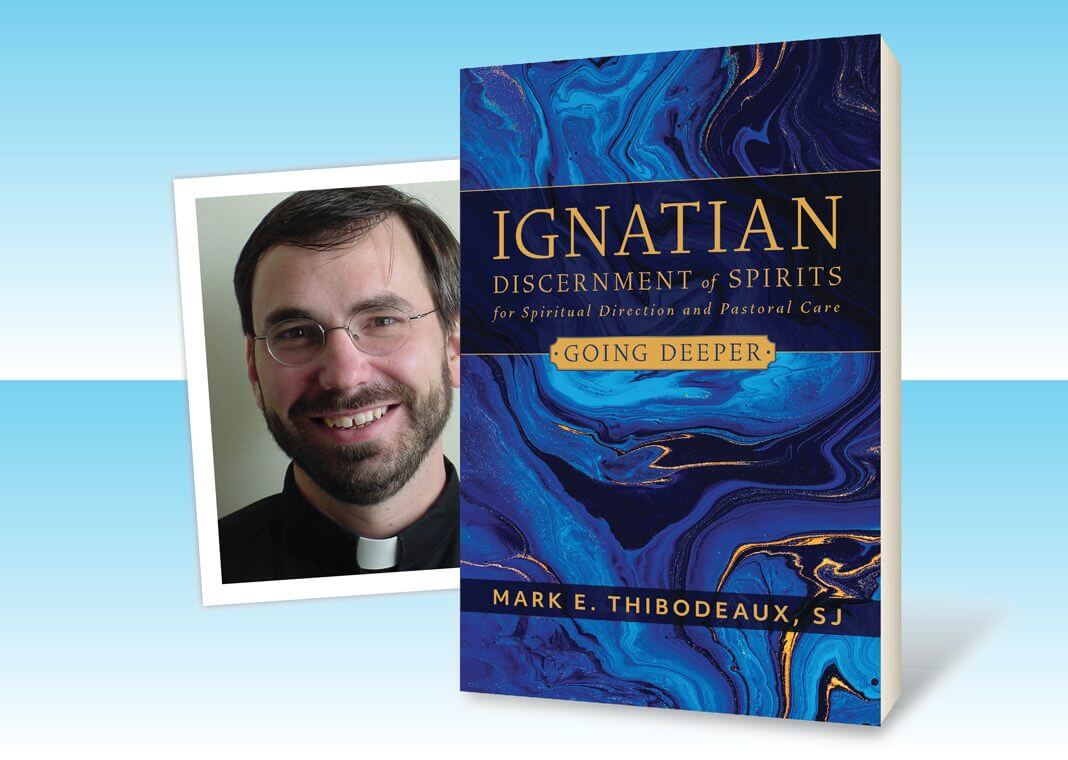All of us are rightly wary of the incorrect reduction of the concepts of desolation and consolation to merely feeling bad and feeling good. But the reason this misconception is so persistent is that we do indeed usually feel good in consolation and usually feel bad in desolation. It’s an understandable mistake, then, to reduce such states to those feelings. We are not helped by the Autobiography when St. Ignatius seems to reduce the states to “sad” and “joyful.” In that spot in the autobiography, Ignatius is showing us how simple was his own understanding of these states as he began the spiritual life. Note that as a beginner in the spiritual life, he had no notion of false consolation. In his Rules for Discernment of Spirits he delves into the subtleties of the spiritual life and no longer reduces the states to “sad” and “joyful.” He now has a name for the experience of feeling consoled while unknowingly being in the state of desolation. He calls this state false consolation and rightly explains that it is, in fact, desolation. With this third state, we can put together a matrix:

When it feels like consolation and it actually is, Ignatius calls it consolation. Likewise, when it feels like desolation and actually is, he calls it desolation. He then adds nuance by giving the name false consolation to the state in which it feels like consolation but actually is desolation. But the matrix exposes a lacuna. What might we call the state in which it feels like desolation but actually is consolation? Ignatius has no name for this. Instead he lumps the experience in with “regular” consolation, saying that consolation can be accompanied by tears of sorrow or of joy.
Not having a name for this experience is a problem because it is an incredibly common occurrence. To name just a few examples, we might experience grief, psychological depression, righteous anger, and fear, yet still be in sync with God and have great desires for faith, hope, and love. We might be suffering from unrequited love or from dry prayer. We might—despite our best efforts—have failed at something important to us and are terribly sad about it. These kinds of experiences happen to us all the time. We need a name for it if we’re going to be using this language regularly in pastoral counseling, spiritual direction, and so on. For the past several years, then, I have been using the term difficult consolation to refer to this spiritual state of being. The people to whom I’ve introduced this term—such as spiritual directees and novices—have found it tremendously helpful, as have I as their director.
We have learned that St. Teresa of Calcutta had terrible interior struggles for decades. The experience is painfully laid out in the posthumously published memoir Come Be My Light. When giving workshops on discernment of spirits, I am often asked about her situation. It is indeed a puzzling case. How could someone who was so in sync with God and who so obviously passionately pursued faith, hope, and love be considered to be in desolation all that time? It seems to me that as we traditionally think of consolation and desolation, Mother Teresa simply doesn’t fit the categories. However, she could be the patron saint of those in difficult consolation. She fits the description perfectly: she was in fact in consolation. We know this by her unquestionable sanctity and love for humankind. But she was also miserable, and she interiorly experienced the feelings of desolation. She was in difficult consolation. The same might be said of St. John of the Cross’s experience of the “dark night of the soul.”
—Excerpted from Ignatian Discernment of Spirits in Spiritual Direction and Pastoral Care by Mark E. Thibodeaux, SJ


I have sometimes referred to this as “natural desolation” with “spiritual consolation”. For an example, there is natural desolation when someone we love dies or is sick, but it may be accompanied by spiritual consolation, sensing God being close to me and the person who is suffering.
It seems to me that an appropriate word for “difficult consolation” is suffering. While we yet hope in the goodness of God’s promises (particularly in effecting ultimate justice), His love for us, His continued care for us, while we experience the pain of whatever we are enduring in the moment (as in the case of Mother Theresa’s endurance of seeing the depravity of man toward the children in Calcutta and the heaviness of her own work with so many deeply wounded – unarguably she was living in “consolation” – in the righteous work of God and God’s intended flourishing on earth) – this sounds like suffering – doing what is right and reflects God’s goodness, while yet baring the pain of what must be borne to accomplish the work. This is suffering, and it is (speaking from my own experience) potentially an experience of profound unity with Christ in His suffering. I experienced it as the deepest sense of closeness I have had with Jesus when I was in the midst of profound suffering (based on actions I was taking that were truly in God’s will, but yielded persecution from the world). As a side note, it is indeed perplexing that Mother Theresa felt so far from God during her ministry. I only argue that a good word/term for “difficult consolation” is suffering, not that all people will or necessarily should experience closeness to Jesus in such a time.
Thank you for this enlightening post. I love his approach and ‘difficult consolation’ really says ‘whats in the can’ and helps to fill the ‘difficult’ gap left by Ignatius in his teaching on discernment. Looking forward to reading the rest of Fr. Marks book on discernment in Spiritual Direction which I have eagerly ordered.
This reflection brought to my mind GM Hopkins’ poem “Thou art indeed just Lord” which addresses this difficult consolation. We do, and we do, and positive change does not seem to occur. The poor we still (and will always) have with us. Here are the lines Hopkins wrote:
“….birds build–but not I build; no, but strain,
Time’s eunuch, and not breed one work that wakes.
Mine, O Thou Lord of Life, send my roots rain.”
He does not give up in despair. He asks God for more help to continue loving and helping those people who come before him.
I see difficult consolation a dry period, and so I too need rain for my “roots.”
A very good reflection so as not to confuse these terms. I agree with difficult consolation because at times some words don’t fit well to what one experience or feel. Thanks Fr. Mark for explaining the three terms.
Difficult consolation , it’s a great term and probably very close to the mark of this particular feeling that I experience. I am in a place that does not make me happy yet I stay here as I feel it is Gods will and that I am accomplishing His purposes. It’s the same kind of feeling when my sister and I used to argue and get cross but still do nice things for each other. Difficult consolation. Quite apt
Currently I’m reading and pondering the Psalms which are beautiful reflections of consolation and desolation. Many are written by David, who was devoted to God through numerous difficult situations and through David’s own very significant wrong-doing he was able to recognise and ‘own’ his frailty and his longing for God’s love which was constant. My realisation that I don’t need to be perfect – I am already deeply loved and accepted by God – makes me strive to show my contentment. Even as I authentically display discontentment.
Mark, it’s so good to be able to more clearly articulate what has been going on in me and in some of my directees lately. Thank you for these new insights and this welcome language. As always, you are right on target.
Love this. I think I will adopt this term difficult consolation. Very useful!
Thank you for posting this. This is a very helpful description of a state I have experienced and was confused by. Experiencing considerable pain alongside a deep “knowing” that you are indeed in the center of God’s will is possible. Now I have a better way to describe it. Thanks again.